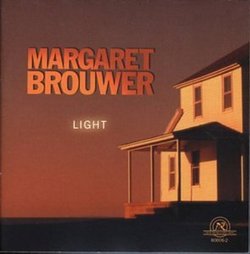| All Artists: Margaret Brouwer, Jeannette Sorrell, Kathryn Brown, Mitsuko Morikawa, Sandra Simon Title: Margaret Brouwer - Light Members Wishing: 0 Total Copies: 0 Label: New World Records Original Release Date: 1/1/2003 Re-Release Date: 12/30/2003 Genres: Pop, Classical Styles: Vocal Pop, Chamber Music, Historical Periods, Classical (c.1770-1830), Early Music Number of Discs: 1 SwapaCD Credits: 1 UPC: 093228060628 |
Search - Margaret Brouwer, Jeannette Sorrell, Kathryn Brown :: Margaret Brouwer - Light
 | Margaret Brouwer, Jeannette Sorrell, Kathryn Brown Margaret Brouwer - Light Genres: Pop, Classical
As a composer who started out as an orchestral player, Margaret Brouwer (b. 1940) had an advantage that many of her colleagues never experience: absorbing the panoply of sounds around her. Her life as a performer helps to ... more » |
Larger Image |
CD Details
Synopsis
Album Description
As a composer who started out as an orchestral player, Margaret Brouwer (b. 1940) had an advantage that many of her colleagues never experience: absorbing the panoply of sounds around her. Her life as a performer helps to explain the clarity of her writing, as well as her fascination with the distinctive colors of instruments alone and in myriad combinations. Brouwer?s music possesses an almost childlike sense of enchantment and fantasy. It is immediately accessible without sounding glib or simple, the result of the composer?s painstaking effort to employ sophistication and complexity within an organic unfolding of ideas. Brouwer set out on her creative odyssey when the severity that had pervaded composition in the post?World War II period was beginning to crumble, at least outside staunch avant-garde circles. Brouwer soaked up every style of music and developed a personal artistic profile that favors illumination over impenetrability. She most admires composers whose music appeals both to heart and mind. In particular, she cites Mozart for beauty and depth; Beethoven, for unity through development of small ideas; Stravinsky, for rhythm and structure; and Crumb, for varied sounds and colors. The chamber works on this recording?Lament (violin, clarinet, bassoon, percussion), Light (soprano, harpsichord, flute, clarinet, violin, cello, percussion) Under the Summer Tree ?, (solo piano), Skyriding (flute, violin, cello, piano), Demeter Prelude (string quartet)?reveal the gamut of Brouwer?s art, traveling both in dark and light regions. In many ways, the pieces move in order from the former to the latter, starting in the abyss (though not without buoyant moments) in Lament and ending up on the heights (despite a sojourn to Hell) in Demeter Prelude. The titles of these compositions suggest a composer who relies on programmatic references for her musical ideas. Most of the time, the reverse actually is true. Music comes first; imagery later, as a work?s character evolves.

 Track Listings (14) - Disc #1
Track Listings (14) - Disc #1